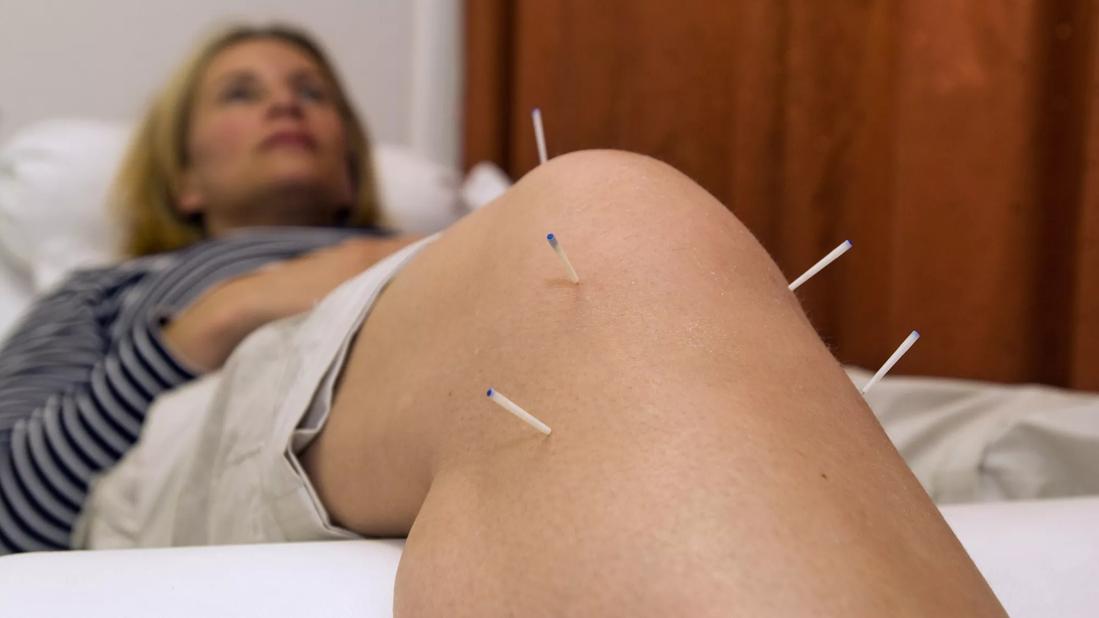Traditional Chinese medicine technique recommended for chronic pain

Image content: This image is available to view online.
View image online (https://assets.clevelandclinic.org/transform/3051dd1b-7036-43d9-80db-5b2e46854975/AcupunctureKnee_jpg)
Knee Arthritis Got You Down? Acupuncture Can Bring Relief
Contributor: Jamie Starkey, LAc
Advertisement
Cleveland Clinic is a non-profit academic medical center. Advertising on our site helps support our mission. We do not endorse non-Cleveland Clinic products or services. Policy
When your knee aches, day after day, you can’t walk easily. Climbing up and down stairs is a challenge. Pain wakes you up at night. It’s always on your mind.
Osteoarthritis (OA) is one of the most common causes of chronic knee pain. It causes pain, inflammation and stiffness, making it hard to flex and extend your knee.
Across the country, doctors are striving to avoid prescribing medication, particularly opioids, for chronic pain. Research shows acupuncture to be a cost-effective way to treat pain with very little risk for the patient.
In fact, acupuncture is one of the treatments recommended for knee pain from osteoarthritis in national guidelines for physicians.
Acupuncture is a branch of traditional Chinese medicine, with a rich history and lineage dating back thousands of years. It involves inserting hair-thin needles into the body to promote pain-relieving and anti-inflammatory effects.
No two patients are treated alike. Some patients find relief with needles alone. Others need a more involved technique, such as electro-acupuncture (technically called percutaneous electrical nerve stimulation, or PENS).
Patients with knee arthritis respond particularly well to electro-acupuncture. When knee arthritis is mild or moderate, a limited number of sessions produce very good results. When arthritis is more advanced, or “bone-on-bone,” ongoing acupuncture is needed.
Acupuncture can also be combined with conventional treatments, such as non-steroidal anti-inflammatory drugs, physical therapy and/or injections. In addition, acupuncture can provide short-term pain relief until knee replacement surgery is performed.
Advertisement
Many clinical studies support acupuncture’s ability to relieve osteoarthritis pain, particularly in the knee. One study of 18,000 patients found acupuncture to be helpful for many pain conditions, including knee osteoarthritis.
In addition to promoting an anti-inflammatory effect, studies show that acupuncture releases endogenous opioid endorphins (the body’s natural pain-relieving chemicals).
So where can you find an acupuncturist? Today, you can find one at your local hospital or in a private practitioner’s office.
Wherever you choose to go, your initial appointment will typically take longest. The acupuncturist will do a detailed assessment in order to create a treatment plan for you.
They can keep your physician informed about your progress.
Don’t let arthritis of the knee keep you in constant pain, and limit your ability to function and enjoy life.
But today, more than ever, it’s important to look beyond chronic pain medicine — especially opioids — for solutions.
Acupuncture is a good option to keep in mind to decrease pain, inflammation and stiffness, and increase range of motion, in your knee. And that can improve your over all quality of life, meaning you can better participate in all of your day-to-day activities, whether that’s at work, the park or the gym!
Advertisement

Delivered every Tuesday!
Sign up for our Health Essentials emails for expert guidance on nutrition, fitness, sleep, skin care and more
Learn more about our editorial process.
Advertisement
It’s great for stress relief, which can go a long way when you’re trying to conceive
This ancient treatment is often a complement to acupuncture
Discover the benefits of this ear acupuncture technique
Find out what it is and how it can help the body heal
Test your knowledge about this ancient medical art
Acupuncture, herbs and hypnotherapy curb cravings naturally
New government advisory recommends non-addictive options first
Both can help reduce pain, but they’re very different in terms of origins, philosophies and practices
Type 2 diabetes isn’t inevitable with these dietary changes
Applying a hot or cold compress can help with pain
Pump up your iron intake with foods like tuna, tofu and turkey